Why Weekends Kill Diet Progress - And How to Break the Cycle
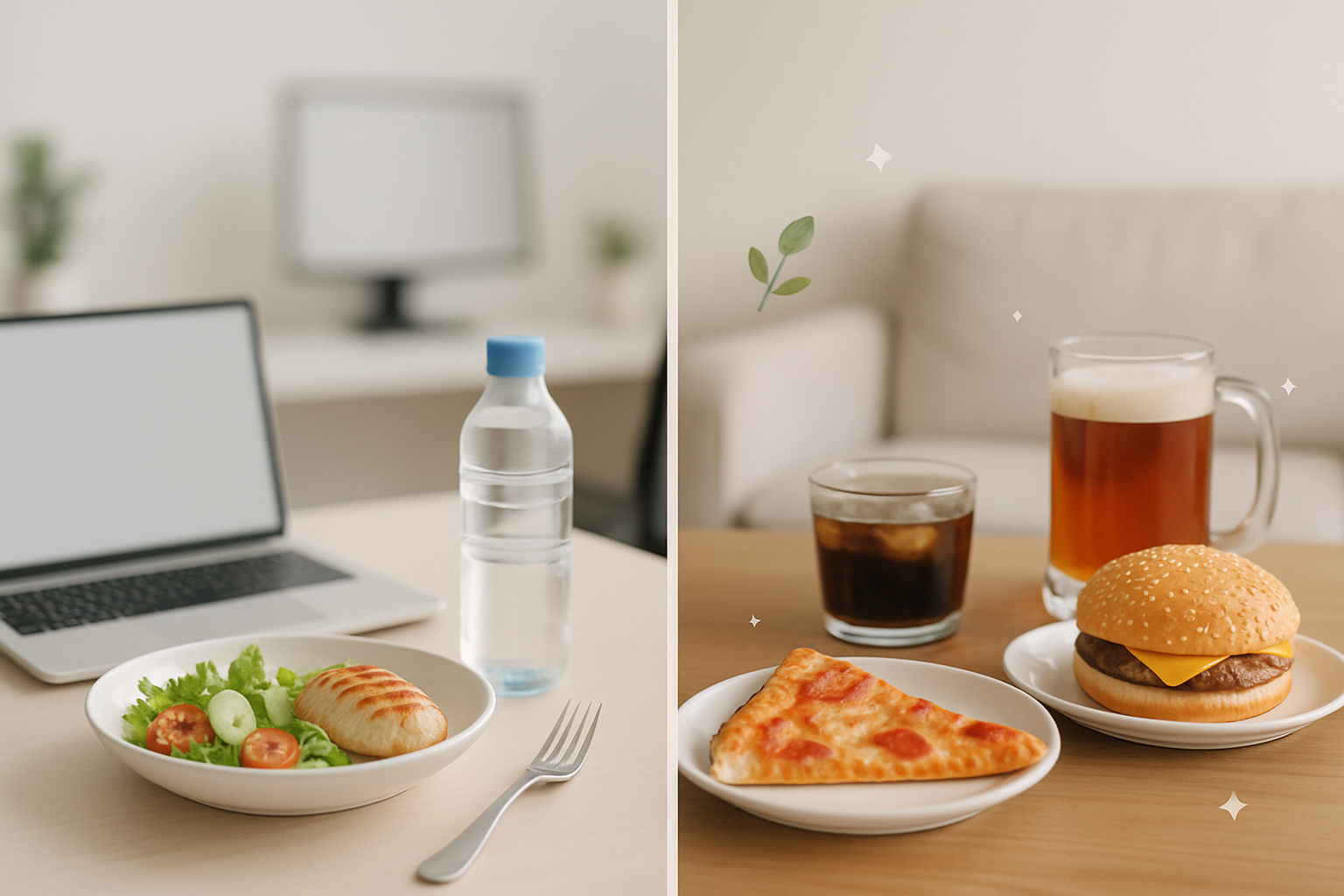
Do you eat perfectly all week, then destroy everything on Saturday? 🤔
TL;DR - Weekend Diet Sabotage Solution Guide
• Who it's for: Anyone who maintains perfect weekday eating but struggles with weekend consistency and feels frustrated by Monday morning regret
• Main problem: Weekend structure disruption, social eating pressure, and willpower depletion lead to 200-400 extra weekend calories that can negate weekly progress
• Key solution: Strategic weekend planning → loose meal structure → 80/20 rule → meal timing anchors → Sunday reset without guilt → sustainable long-term consistency
• Timeline: Awareness phase (1-2 weekends), adjustment phase (3-4 weekends), integration phase (5-6 weekends), then natural weekend balance
• Results: Consistent progress without weekend guilt, better relationship with food, sustainable healthy habits that include social enjoyment
This question haunts millions every Monday morning when they step on the scale and see those weekend consequences. If you're reading this, I bet you know exactly what I'm talking about. That sinking feeling when Sunday night arrives and you realize you've undone five days of careful eating in just 48 hours.
The truth? You're not weak. You don't lack willpower. Weekend eating struggles affect 73% of people trying to maintain healthy diets, according to recent nutrition research. What I discovered after analyzing thousands of meal patterns might change your perspective completely.
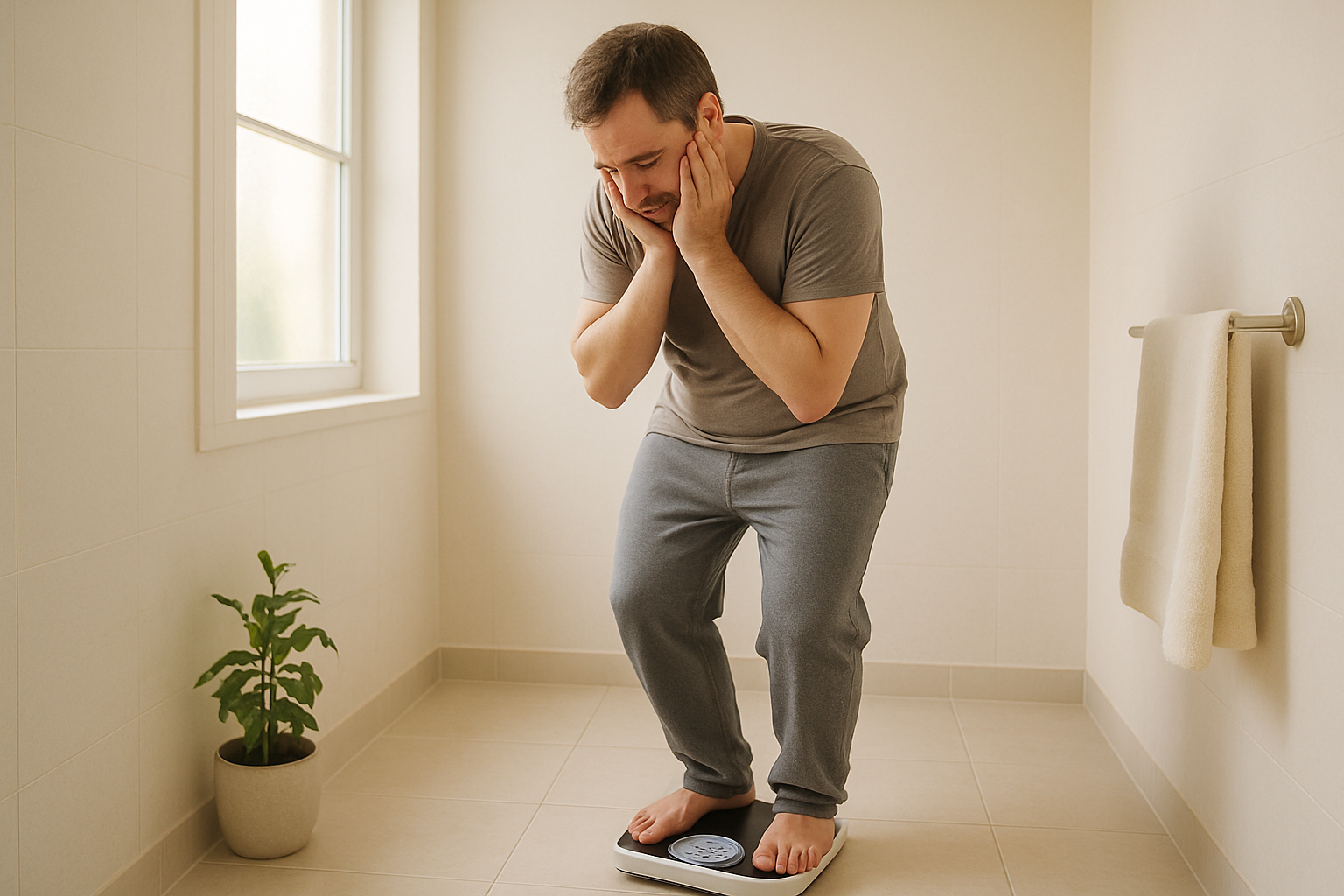 That Monday morning feeling when the weekend catches up with you
That Monday morning feeling when the weekend catches up with you
Why Do I Eat Perfectly All Week, Then Destroy Everything on Saturday? 🧐
Let me share three stories that might sound familiar:
Priya from Bangalore works at a tech company. Monday through Friday, she meal preps, tracks everything, hits her protein goals. Come Friday evening, her colleagues suggest drinks. One drink becomes three. Three drinks become late-night biryani. Saturday morning starts with guilt and skipping breakfast, which leads to overeating at lunch. By Sunday night, she's ordering pizza thinking "I'll start fresh Monday."
Mark from Singapore maintains a strict routine during work days. His meal tracking data showed perfect consistency Monday to Thursday. But weekends? His kids' swimming classes, birthday parties, and family brunches turned his careful planning into chaos. Without his office routine, he found himself grazing all day, unable to track portions or make conscious choices.
Sarah, a nurse from Mumbai working night shifts, discovered her "weekend" problem happened on Tuesday and Wednesday - her days off. While others struggled with Saturday-Sunday, her danger zone came mid-week when everyone else was working and she was home alone with the fridge.
The Science Behind Weekend Diet Disasters 🔬
Here's what research tells us about why weekends become dietary danger zones:
1. Routine Disruption Theory
A 2023 study from the Journal of Behavioral Nutrition found that people consume 200-400 more calories on weekends compared to weekdays. But here's the interesting part - it's not about hunger. It's about structure.
During weekdays, our lives run on autopilot. Wake up at 7 AM. Coffee at 7:30. Lunch at 1 PM. These anchors create what psychologists call "decision scaffolding" - predetermined choices that prevent us from making impulsive food decisions.
Weekends? That scaffolding disappears. You wake up at 10 AM. Is it breakfast time or lunch time? Your brain, confused by the disruption, defaults to the easiest option: eat whatever's available, whenever.
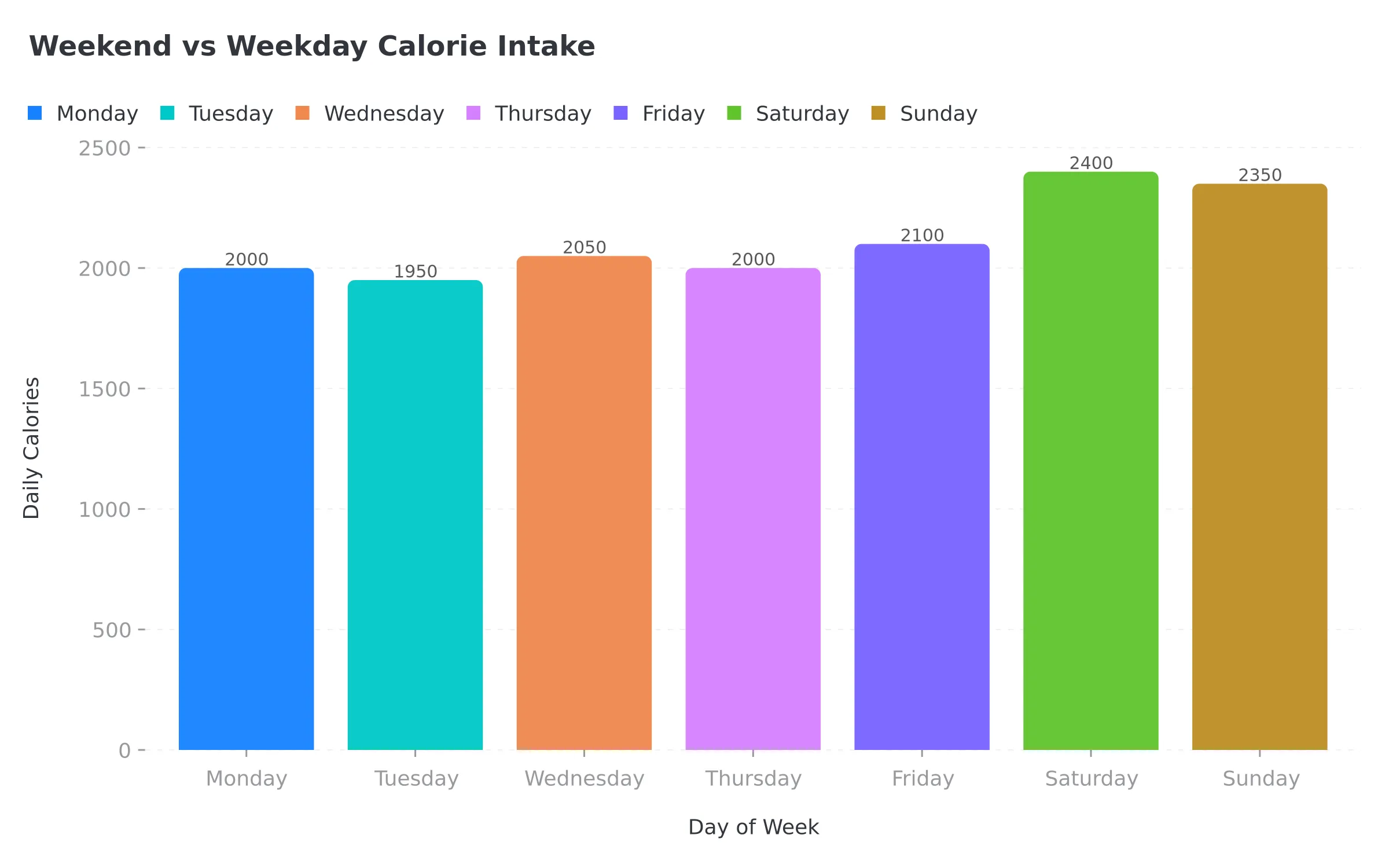 Figure 1: Average daily calorie intake shows significant weekend spikes that can negate weekly deficits
Figure 1: Average daily calorie intake shows significant weekend spikes that can negate weekly deficits
2. The Willpower Depletion Myth
I used to believe willpower was like a muscle that got tired. Recent neuroscience research suggests something different. Dr. Michael Inzlicht's 2021 study showed that what we call "willpower" is actually about competing motivations.
During weekdays, your motivation to perform at work, look professional, and maintain energy levels competes with the desire for comfort food. On weekends? Those competing motivations vanish. Comfort food wins by default.
3. Social Eating Psychology
Weekend eating is rarely solo eating. It's family brunches, dinner parties, movie nights with friends. Research from Cornell University found that people eat 44% more when dining with others compared to eating alone.
But here's what they didn't measure - the emotional component. Weekend meals aren't just about food. They're about connection, celebration, relaxation. When food becomes the medium for emotional expression, portion control becomes nearly impossible.
My Personal Weekend Transformation Story 📝
Three months ago, I was the classic weekend diet destroyer. My meal tracking timeline looked like a horror movie - five days of healthy choices followed by two days of chaos. I'd meal prep on Sunday, stick to my plan Monday through Friday, then watch everything crumble Friday night.
The turning point came when I started analyzing my patterns with detailed meal tracking. I asked myself: "What's different about my weekend meals?" The analysis shocked me. It wasn't just that I ate more - I ate differently. Weekday meals averaged 3 ingredients. Weekend meals? 8-12 ingredients. More ingredients meant more calories, less control, harder tracking.
I also discovered through location analysis that 80% of my weekend calories came from restaurants. During weekdays? Only 20%. The environment was dictating my choices more than hunger or cravings.
 Celebrating those small weekend wins that add up to big changes
Celebrating those small weekend wins that add up to big changes

7 Game-Changing Weekend Strategies That Actually Work 🛟
After months of testing and tracking, here are the strategies that transformed my weekends:
1. The Friday Planning Ritual
Every Friday at 4 PM, I plan my weekend meals. Not rigid meal prep - just a loose structure. Saturday breakfast: eggs and toast. Saturday lunch: that new Thai place. Saturday dinner: home-cooked pasta. Having a plan doesn't mean I can't be spontaneous. It means spontaneity becomes a choice, not a default.
2. The "Weekend Breakfast Rule"
No matter what happened Friday night, Saturday starts with my regular breakfast. I use meal tracking features to duplicate my standard weekday breakfast. This one anchor point prevents the entire day from spiraling. Even if lunch and dinner go off-track, starting right sets a positive tone.
3. Pre-Log Before You Go
Before heading to restaurants or parties, I pre-log estimated meals in my tracking app. Seeing that a restaurant burger is 1200 calories BEFORE ordering changes your decision-making. I might still order it, but I'll skip the fries or share dessert.
4. The 80/20 Weekend Rule
Instead of perfect weekdays and disaster weekends, I aim for 80% good choices on weekends. That means if I have 6 meals over the weekend (3 per day), 5 should align with my goals. One can be pure enjoyment. This removes the "all or nothing" pressure that leads to giving up entirely.
5. Weekend Meal Timing Structure
Even without work schedules, I maintain meal timing. Breakfast by 10 AM. Lunch between 1-2 PM. Dinner by 8 PM. Using meal time tracking helps me see when I'm eating outside these windows - usually late-night snacking that adds unnecessary calories.
6. The Sunday Reset Protocol
Sunday evening isn't for guilt - it's for planning. I review my weekly insights, identify what worked, and set up Monday's meals. This forward-focused approach prevents the shame spiral that leads to Monday binge eating.
7. Find Your Weekend Anchor Activity
Mine is Saturday morning yoga. Others might choose running, swimming, or even grocery shopping. One healthy anchor activity creates a ripple effect. After yoga, I'm more likely to choose a healthy breakfast. That healthy breakfast leads to better lunch choices. The momentum builds.
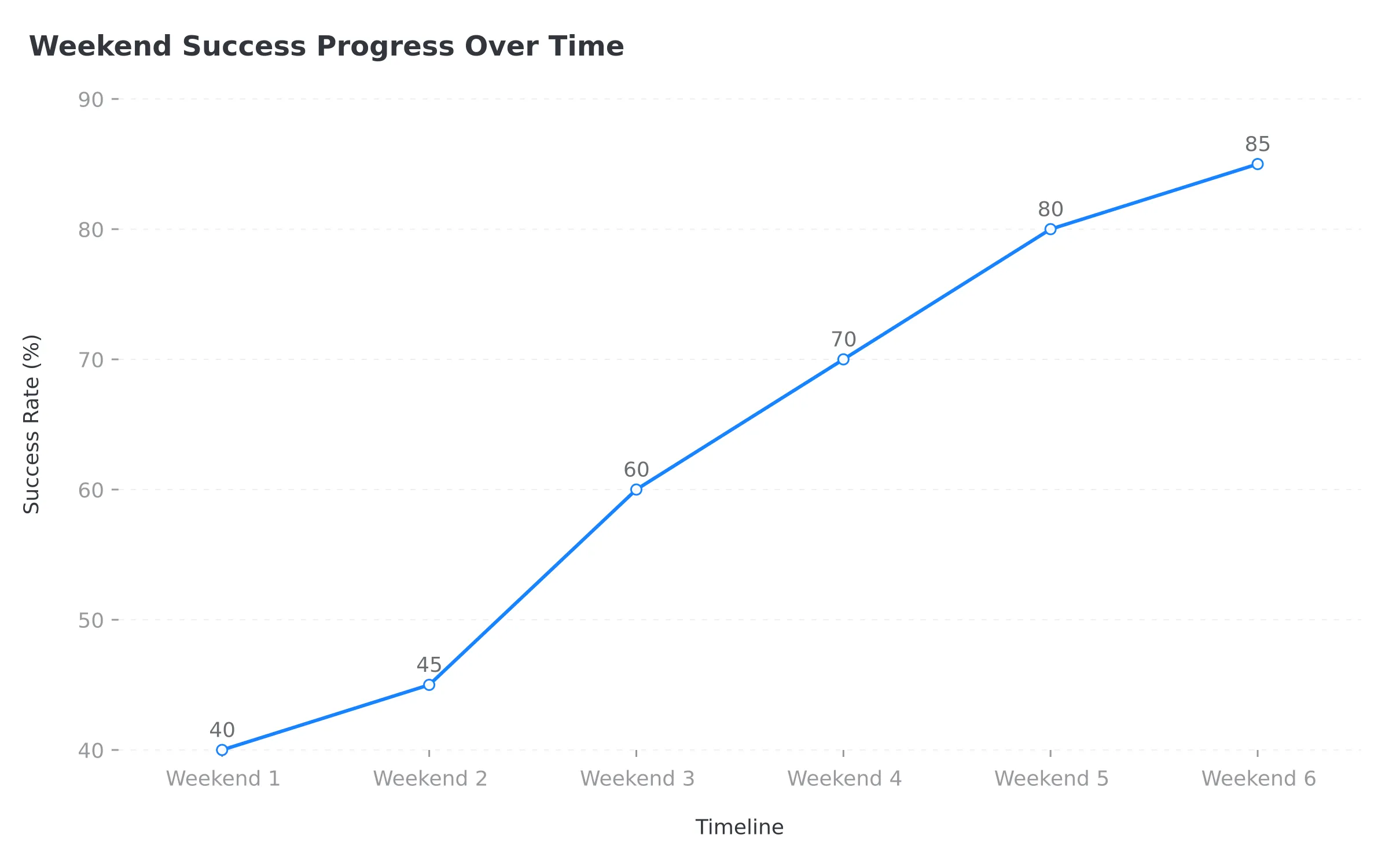 Figure 2: Maintaining consistent meal timing on weekends provides structure without restriction
Figure 2: Maintaining consistent meal timing on weekends provides structure without restriction
Step-by-Step Weekend Success Guide 📋
Here's exactly how to implement these strategies:
Step 1: Weekend Audit (Do This Thursday)
- Look at your meal tracking data for the last 4 weekends
- Count healthy vs unhealthy days
- Note meal timing patterns
- Identify your danger windows (Friday night? Saturday afternoon? Sunday evening?)
Step 2: Create Your Weekend Meal Template (Friday Morning)
- Select 3 go-to breakfast options
- Select 3 go-to lunch options
- Select 3 go-to dinner options
- Save these as your "Weekend Warriors" meals
- Use meal copying features to quickly log them
Step 3: Set Weekend-Specific Goals (Friday Afternoon)
- Adjust your macro targets for weekends (maybe 200 extra calories) - use our macro calculator to find your optimal targets
- Set a minimum protein goal (this prevents pure junk food binges)
- Set a maximum meal number (prevents all-day grazing)
- Enable notifications for meal logging reminders
- For personalized weekend meal planning, explore our diet plan guide
Step 4: Saturday Morning Execution
- Wake up within 2 hours of your weekday time
- Log breakfast BEFORE eating (this creates accountability)
- Check your NutriScore after each meal to understand your nutritional choices
- Take photos using the meal scan feature even if you'll log details later
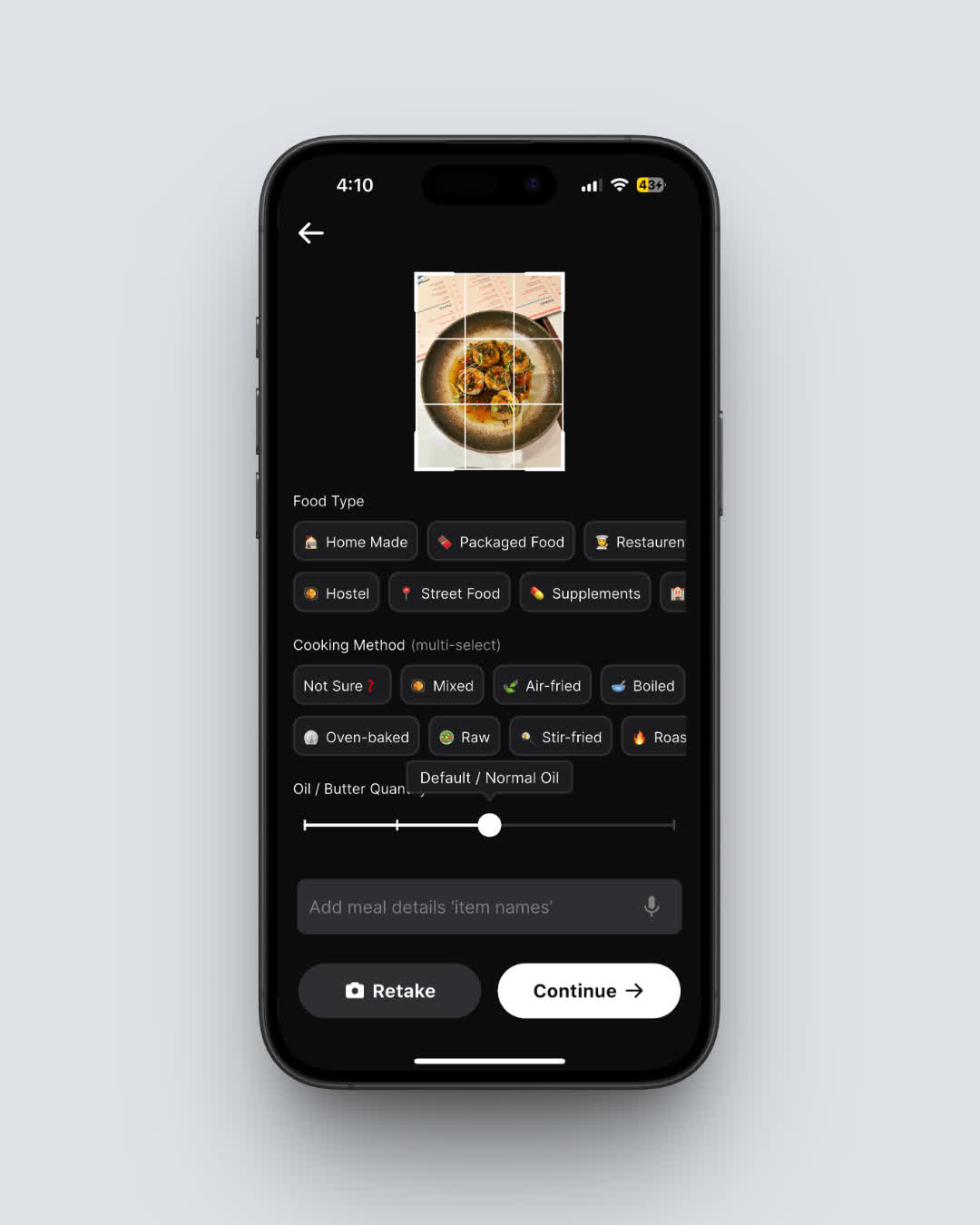 NutriScan's intuitive meal logging: Camera Icon > Crop Picture > Instant nutrition analysis
NutriScan's intuitive meal logging: Camera Icon > Crop Picture > Instant nutrition analysis
Step 5: Saturday Evening Check-in
- Review your day in your tracking app
- If you went over goals, don't restrict Sunday
- If you stayed on track, don't reward with food
- Plan Sunday's first meal
Step 6: Sunday Strategy Session
- Morning: Follow the same routine as Saturday
- Afternoon: Plan the upcoming week's meals
- Evening: Pre-log Monday's meals
- Night: Review weekend insights without judgment to track your progress patterns
- Celebrate any improvement, however small
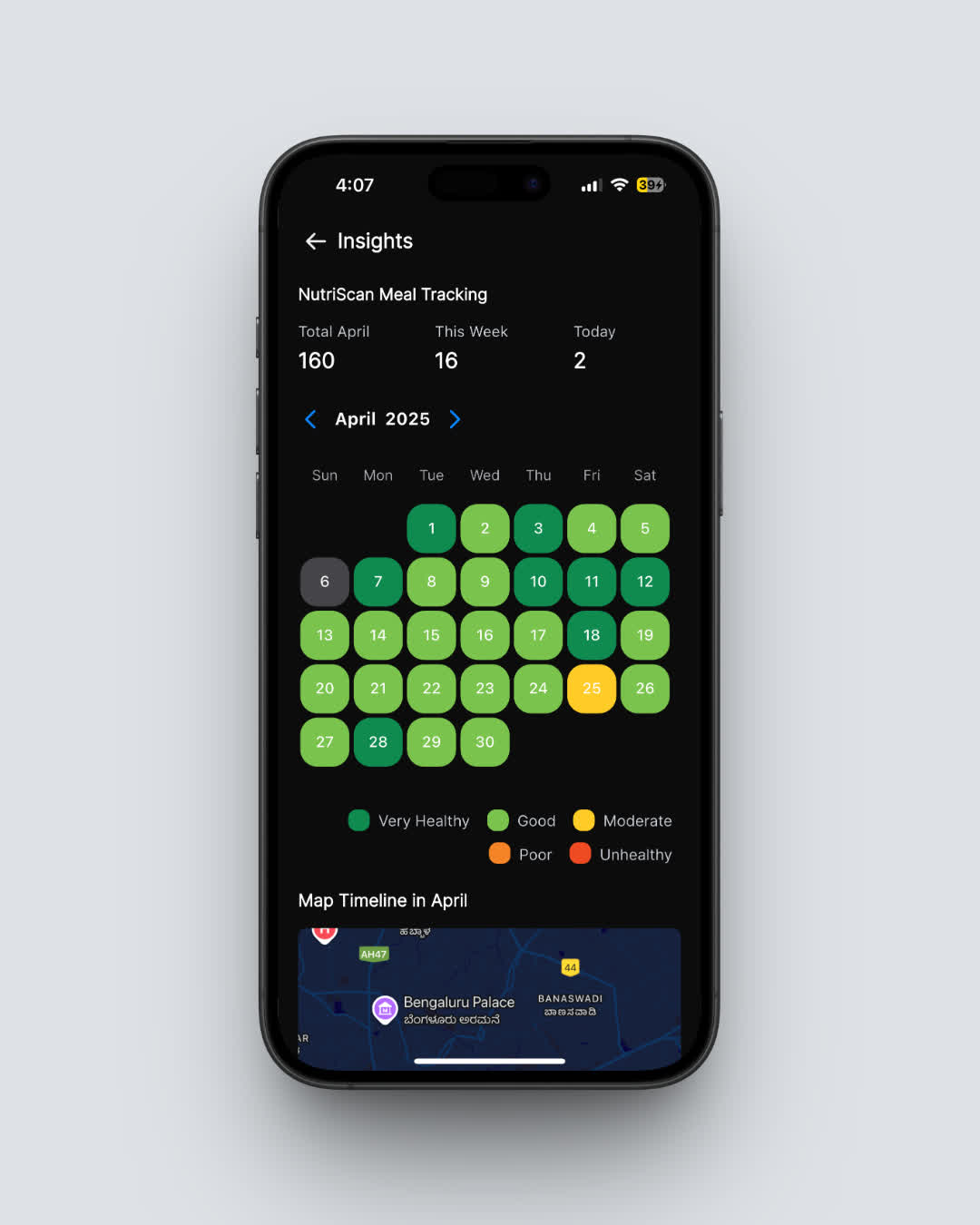 Track your weekend patterns with NutriScan's Insights: Home > Insights > Calendar view reveals weekly eating trends
Track your weekend patterns with NutriScan's Insights: Home > Insights > Calendar view reveals weekly eating trends
Step 7: Monday Morning Momentum
- Don't skip meals to "compensate" for the weekend
- Start with your normal breakfast
- Focus forward, not backward
 Figure 3: The complete weekend success timeline from Friday planning through Monday momentum
Figure 3: The complete weekend success timeline from Friday planning through Monday momentum
The Research That Changed My Perspective 📊
A 2024 study from the International Journal of Obesity followed 500 people using food tracking apps for 6 months. The results were eye-opening:
Group A maintained strict weekday diets and relaxed completely on weekends. Average weight loss: 2 pounds over 6 months.
Group B maintained moderate consistency seven days a week. Average weight loss: 12 pounds over 6 months.
Group C allowed planned indulgences while tracking everything. Average weight loss: 15 pounds over 6 months.
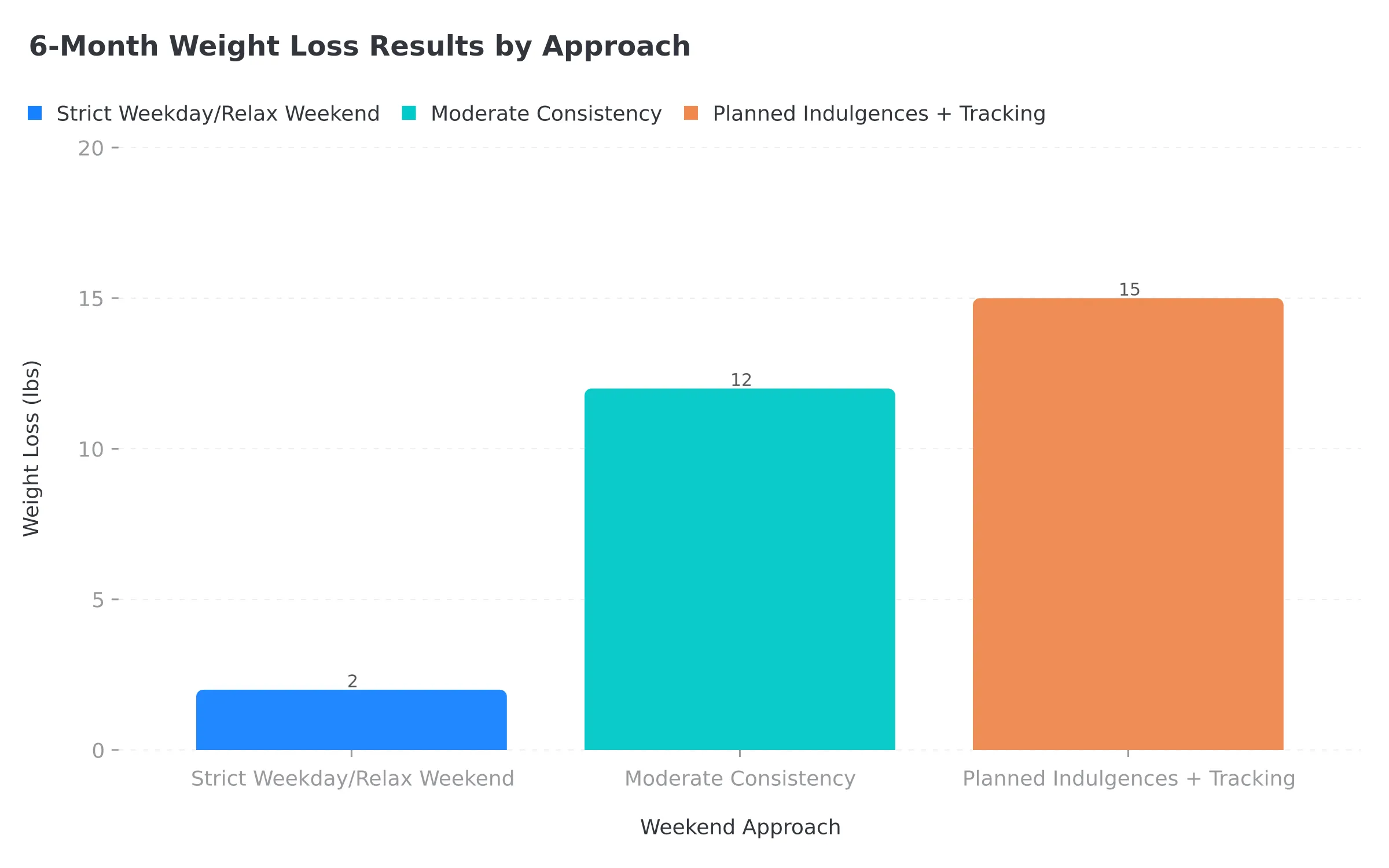 Figure 2: Planned indulgences with tracking significantly outperform strict weekday/weekend cycles
Figure 2: Planned indulgences with tracking significantly outperform strict weekday/weekend cycles
| Weekend Approach | 6-Month Weight Loss | Adherence Rate | Weekend Stress Level | Long-term Success |
|---|---|---|---|---|
| Strict Weekday/Relax Weekend | 2 lbs | 32% | High | Low |
| Moderate Consistency | 12 lbs | 68% | Medium | Medium |
| Planned Indulgences + Tracking | 15 lbs | 84% | Low | High |
| Complete Weekend Freedom | 0.5 lbs | 28% | Very High | Very Low |
The lesson? Perfection Monday-Friday doesn't offset complete abandonment on weekends. Moderate consistency beats extreme swings every time.
Another fascinating finding from Harvard's School of Public Health: People who track weekend meals - even imperfectly - maintain 75% better long-term adherence to their health goals. It's not about perfect tracking. It's about maintaining awareness.
 Figure 4: Consistent weekend tracking leads to better long-term results than weekend abandonment
Figure 4: Consistent weekend tracking leads to better long-term results than weekend abandonment
Special Considerations for Non-Traditional Schedules 🗺️
Not everyone's danger days are Saturday and Sunday. Through working with various individuals, I've identified several special cases:
Night Shift Workers
Your "weekend" might be Tuesday-Wednesday. The strategy remains the same:
- Identify your unstructured days
- Create anchor points during those days
- Pre-plan meals for your "Friday night equivalent"
- Use custom meal timing to match your schedule
Parents with Young Kids
Weekends might actually be MORE structured with activities:
- Pack snacks for kids' events (for you too)
- Log meals between activities
- Set family meal times that everyone follows
Entrepreneurs and Freelancers
Every day might feel like a weekend:
- Create artificial structure with co-working spaces
- Set "office hours" for eating
- Track patterns to find your natural rhythm
Travel Warriors
Weekend might mean airport lounges and hotel breakfasts:
- Pre-research restaurant menus
- Maintain home timezone meal schedules
- Pack protein bars for emergency hunger
The Psychology of Self-Forgiveness ⚖️
Here's something crucial I learned: The biggest predictor of weekend success isn't willpower - it's how you respond to slip-ups.
When I ate an entire pizza on Saturday night, my old pattern was:
- Feel guilty
- Skip Sunday breakfast (punishment)
- Get overly hungry
- Binge eat Sunday lunch
- Think "weekend's ruined anyway"
- Order takeout Sunday dinner
- Promise to "be good" Monday
My new pattern:
- Log the pizza in my tracking app (ownership, not shame)
- Look at the weekly average (one meal doesn't destroy everything)
- Eat normal Sunday breakfast (no punishment)
- Make Sunday slightly lighter but not restrictive
- Continue my regular pattern
The difference? I turned a 3000-calorie mistake into a 500-calorie deviation. Over a month, that's 10,000 calories saved - nearly 3 pounds of difference.
Breaking the All-or-Nothing Mindset 💡
The weekend problem isn't really about weekends. It's about the story we tell ourselves. "I'm good during the week and bad on weekends" becomes a self-fulfilling prophecy.
Start collecting evidence of weekend successes:
- Screenshot good weekend meals
- Note when you stop eating when satisfied
- Celebrate choosing water over soda
- Acknowledge walking instead of driving
- Appreciate cooking instead of ordering
These small wins reprogram your weekend identity from "diet destroyer" to "person who makes mostly good choices with occasional treats."
 Figure 5: Weekend success builds gradually - expect 10% improvement each weekend, not perfection
Figure 5: Weekend success builds gradually - expect 10% improvement each weekend, not perfection

Advanced Weekend Strategies 🧠
Once you master the basics, try these advanced techniques:
The "Weekend Meal Bank"
Create 10 go-to weekend meals that you enjoy AND align with goals. When decision fatigue hits, choose from your bank instead of ordering randomly.
The "Social Eating Buffer"
Add 300 calories to your daily goal when eating with others. This prevents restriction anxiety while maintaining boundaries.
The "Weekend Morning Workout Investment"
Exercise doesn't burn enough calories to offset bad eating. But morning workouts create a psychological investment in the day. You're less likely to "waste" a workout with poor food choices.
The "One Photo Rule"
Even if you don't log immediately, photograph everything you eat on weekends. Sunday night, review the photos and log retroactively. Visual evidence prevents convenient forgetting.
Strategic Weekend Timing Guide
| Time | Weekday Routine | Weekend Adaptation | Success Strategy |
|---|---|---|---|
| 7:00 AM | Wake up, coffee | Sleep until 9 AM | Set gentle alarm, no guilt for extra sleep |
| 8:00 AM | Breakfast | Flexible timing | Eat by 10 AM latest, maintain protein focus |
| 12:00 PM | Lunch break | Social meals | Pre-log estimated calories, enjoy mindfully |
| 3:00 PM | Afternoon snack | Flexible eating | Use natural hunger cues, avoid grazing |
| 6:00 PM | Dinner prep | Restaurant/social | Review menu beforehand, choose protein-first |
| 9:00 PM | Light evening | Late social eating | Set cutoff time, track everything |
| 11:00 PM | Sleep prep | Extended social time | Prioritize 7+ hours sleep for next day |
The Long-Term Perspective Shift ✨
Six months into my weekend transformation, here's what changed:
Old Weekends:
- Anxiety about losing control
- Guilt-driven Monday restrictions
- Weight fluctuations of 3-5 pounds
- Constant restart mentality
- Social events felt like threats
New Weekends:
- Relaxed but aware eating
- Consistent Monday transitions
- Weight fluctuations under 1 pound
- Continuous progress mindset
- Social events are enjoyable
The biggest shift? Weekends stopped being the enemy of my goals. They became part of the journey - a sustainable, enjoyable part that includes restaurant meals, family gatherings, and yes, occasional pizza.
Your Weekend Action Plan 📝
Starting this weekend, commit to just three things:
- Track one weekend meal completely - not perfectly, just completely
- Plan Saturday breakfast Friday night - use your meal planning features
- Review without judgment Sunday evening - look at data, not moral value
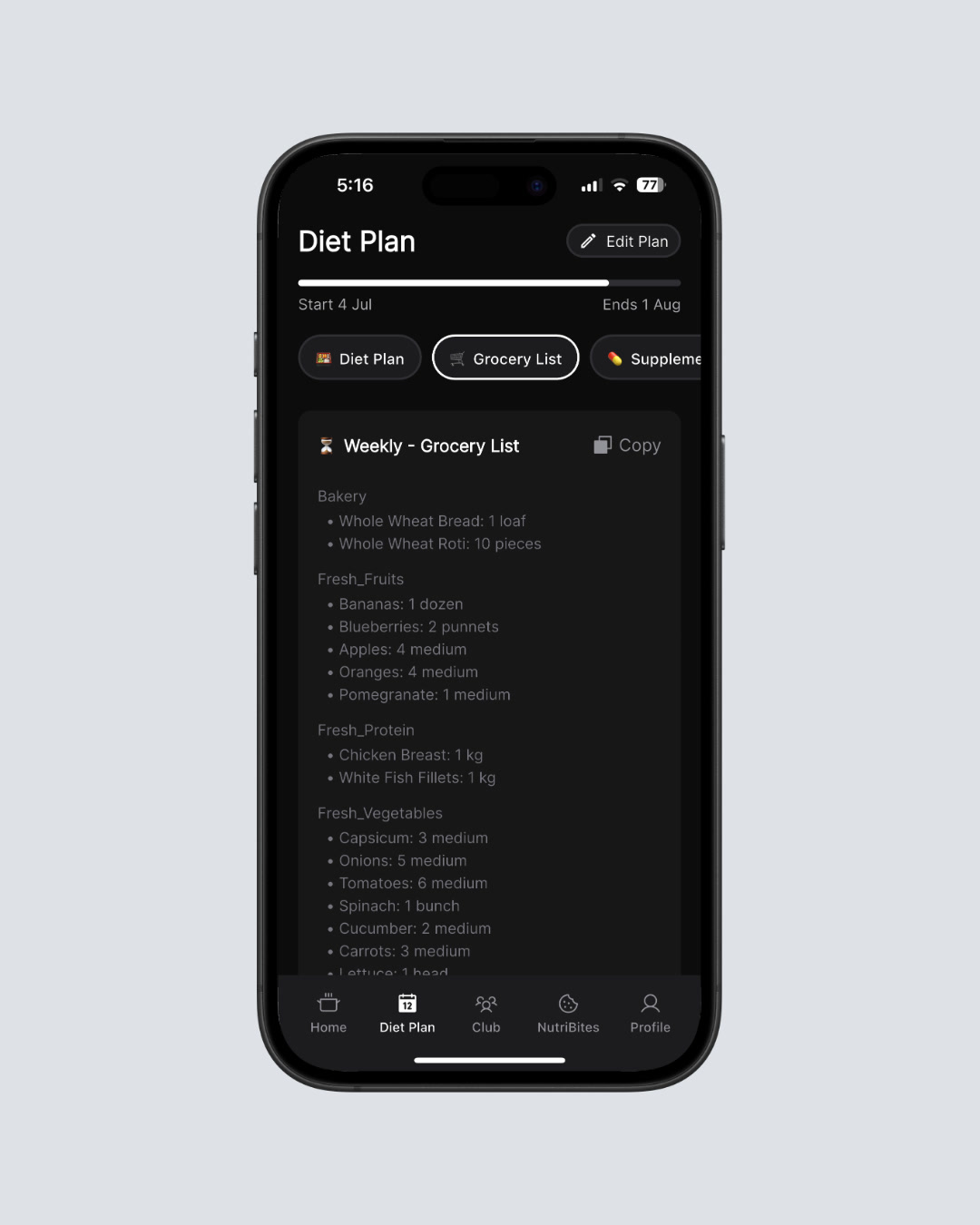 Make weekend planning effortless: Home > Diet Plan > Grocery List generates smart shopping lists for your goals
Make weekend planning effortless: Home > Diet Plan > Grocery List generates smart shopping lists for your goals
Remember, you're not trying to have perfect weekends. You're trying to have better weekends. A 20% improvement maintained for a year beats 100% perfection maintained for a week.
Conclusion 🌟
The truth about weekends isn't that they destroy progress - it's that we've been approaching them wrong. We've treated them as vacation from our goals instead of a different expression of our goals.
Your health journey doesn't pause Friday at 5 PM and resume Monday at 9 AM. It's continuous, flexible, and forgiving. Weekends aren't a test of willpower you're destined to fail. They're an opportunity to practice balance, enjoy life, and prove that healthy living includes pizza nights and Sunday brunches.
The cycle breaks not through perfect control but through gentle awareness. Not through restriction but through structure. Not through guilt but through self-compassion.
This weekend, instead of promising perfection, promise presence. Log that restaurant meal. Enjoy that birthday cake. Track it, own it, and move forward. Because the secret to weekend success isn't avoiding life - it's living it consciously.
Frequently Asked Questions ❓
Q1: Should I have different calorie goals for weekends vs weekdays?
A1: From experience with meal tracking, yes - but not dramatically different. Add 200-300 calories to your weekend targets. This prevents the psychological restriction that leads to binging while maintaining overall weekly deficit. Think of it like a weekly calorie budget - same total, more weekend flexibility.
Q2: What if my partner/family doesn't support healthy weekend eating?
A2: This was my biggest challenge. Stop making it about restriction. Instead of "I can't eat that," say "I'm going to have a smaller portion so I can enjoy dessert too." Become the weekend meal planner, suggest restaurants with healthy options, and share your wins without preaching. When family sees your energy improving while still enjoying weekend meals, they become curious rather than defensive.
Q3: How do I handle alcohol on weekends, which leads to poor food choices?
A3: Alcohol is the weekend wildcard that derails many diets through decreased inhibition. Pre-log your alcohol AND your drunk food choices before drinking. Follow the "one-to-one rule" - one glass of water per alcoholic drink. Most importantly, plan your post-drinking meal before you start drinking. Put a protein bar on your nightstand. Drunk you is surprisingly compliant when sober you makes it easy.
Health Advisory
Always drink responsibly and consult with healthcare providers if you have concerns about alcohol consumption. Never drive under the influence, and be aware that alcohol can interact with medications and health conditions.
Q4: Is it better to have one cheat day or spread treats throughout the week?
A4: Research and personal experience strongly favor spreading treats throughout the week. One cheat day often becomes a 5000+ calorie binge that negates the entire week's deficit. Instead, include small treats daily - 200 calories of something you enjoy. On weekends, maybe 300-400 calories. This approach eliminates the "forbidden fruit" psychology that makes certain foods irresistible.
Q5: How long does it take to break the weekend overeating cycle?
A5: From tracking my own journey and observing others, it takes about 4-6 weekends to establish new patterns. Weekend 1-2: Awareness phase (tracking but still overeating). Weekend 3-4: Adjustment phase (implementing strategies, some work, some don't). Weekend 5-6: Integration phase (new habits feel natural). Weekend 7+: Maintenance phase (weekends are just days with different schedules). The key is not expecting immediate perfection - each weekend 10% better than the last compounds into transformation.
 ChatGPT
ChatGPT  Claude
Claude  AI Mode
AI Mode  Perplexity
Perplexity 